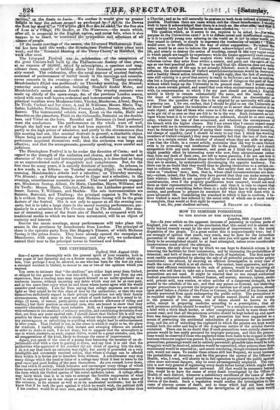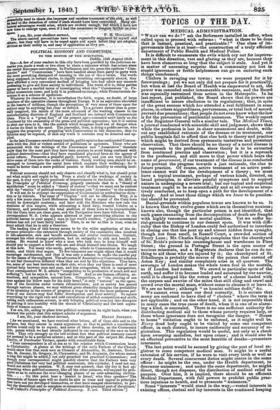HOW TO DIMINISH POISONINGS.
TO THE EDITOR OF THE SPECTATOR.
London, 28th August 1349.
SIR—In your article on the apparent increase of poisoning in various parts of England, you seem to arrive at the conclusion that this social evil is almost en- tirely beyond remedy except by the slow operation of improvement in the moral disposition of the people. To a great extent this is unquestionably true; but I am strongly of opinion that much, very much, may be done for the immediate prevention of this class of crime; and I am sure you will agree that all that is likely to be accomplished should be at least attempted, unless some considerable inconvenience must attend the attempts. Of course, the only direct way by which we can hope to diminish crimes is by removing the facilities for their commission, and by increasing the probabilities of detection; and both of these are within the reach of legislation. The first may be most readily accomplished by placing the sale of all powerful poisons under proper restrictions; the second, by securing an efficient investigation in every case of death the cause of which is at all obscure. The easiest, least oppressive, and pro- bably most efficient restrictions in the sale of poisons, would be by requiring all persons who sell them to take out a licence, and to withdraw such licence if due precautions are not used. It might be enacted that no one except authorized medical practitioners should, without licence, sell arsenic, mercury, opium, oxalic acid, prussic acid, nux vomits, or other articles of a dangerous strength, to be earned in the schedule of the act; and that any person so licensed, not observing proper precautions to prevent the improper or careless use of such poisons, should upon proof before a Justice of the Peace or Coroner, be deprived of his licence, and thereby prevented from again endangering the public satety. The precautions to be required might be, that none of the articles named should be sold except in the presence of two persons, one of whom should be known to the seller, except in preparing medicine according to a prescription ; that all such poisonous articles should be marked "poison" in a conspicuous manner, with a label with a thick black border, or other conspicuous mark to warn those who cannot read; and that all the poisonous articles should be kept locked up and apart from less dangerous substances. This last precaution has been suggested as a means of preventing the accidental substitution of a poisonous for an innocent drug, and the act of unlocking the cupboard in which the poisons are kept would remind both the seller and buyer of the dangerous nature of the articles therein contained. There can be no doubt that if such precautions were strictly observed, poisons would be less easily procured for improper purposes, and that the precau- tions would be observed if those who neglected them were liable to be stopped in their business whenever neglect was proved. It is, however, pretty certain that, in spite of all precautions, poisonings would not be entirely prevented: plausible tales would be told, druggists would be deceived, mistakes would be committed, other poisons than those enumerated would be resorted to; and secret murdering, though rendered more diffi- cult, would not cease. To render these crimes still less frequent, we must increase the probabilities of detection: and for this purpose the agency of the Officers of Health, who, I trust, will shortly be in full operation to guard the public against other more universal dangers, may be most advantageously employed. The cus- tom is now very general of registering every death before burial; which might with little inconvenience be rendered universal. All that would be necessary beyond this, would be to have the cause of every death investigated by the Officer of Health of each district, whenever a satisfactory certificate of the cause of death by a duly authorized medical practitioner was not procured previous to the regis- tration of the death. Such a regulation would confine the investigation to the cases of obscure causes of death, and to those which had not been under authorized medical attendance; and the investigation of all such cases would —poelerfolly tend to check the improper and careless treatment of thii sick, as well as lead to the detection of crime if such should baye been committed. lieu eel- lateral advantages would arise, which are evident enough, but which I have stet now time to enlarge upon, even if I had the conscience to trespass ferther_on your space- The above-named precautions have been repeatedly suggested by myself and others; but they will have to be urged again and again before they are adopted, obvious as their utility is, and easy of application as they are.



























 Previous page
Previous page